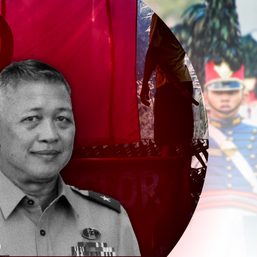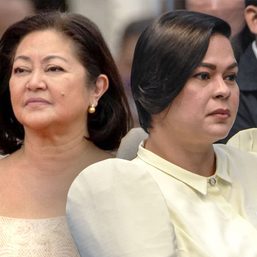SUMMARY
This is AI generated summarization, which may have errors. For context, always refer to the full article.

MANILA, Philippines (UPDATED) – A total of 20 senators, including Senate President Juan Ponce Enrile, declared Chief Justice Renato Corona guilty of betraying the public trust and committing culpable violation of the Constitution.
Only 3 senators — Joker Arroyo, Miriam Defensor-Santiago, and Ferdinand Marcos Jr — voted to acquit Corona of the charges lodged against him by the House of Representatives on Dec. 12, 2011.
The 16th vote — the mininum requirement for the Chief Justice’s conviction and removal from office — was delivered by Lakas Sen Ramon “Bong” Revilla Jr. In explaining his vote, Revilla said Corona has “the responsibility to be the epitomé of a public servant with the highest standards.” But through his own admission, Corona failed to disclose his wealth, Revilla said.
The 20 senators who voted to convict Corona are: Edgardo Angara, Alan Peter Cayetano, Pia Cayetano, Frankin Drilon, Francis Escudero, Jinggoy Estrada, Teofisto Guingona III, Gregorio Honasan, Panfilo Lacson, Lito Lapid, Loren Legarda, Sergio Osmeña III, Francis Pangilinan, Aquilino Pimentel III, Ralph Recto, Ramon Revilla, Vicente Sotto III, Antonio Trillanes IV, Manuel Villar, and Senate President Enrile.

Corona is the first Philippine magistate to be impeached and convicted, and his trial is the first of its kind to be concluded in Philippine history.
The verdict is immediately executory. Enrile, who is also presiding officer of the impeachment court, will be writing a letter Tuesday to all branches of government, particularly the Supreme Court, informing them about the verdict.
The decision removes Corona from his post, disqualifies him from holding public office, and opens him to possible criminal cases.
In explaining his vote, Enrile noted that he took his oath of office before Corona. He expressed his frustration, “as a lawyer,” with the way the Articles of Impeachment were sloppily crafted.
But Enrile said Corona “was deemed duty-bound under the law, they being under his name by his own decalration,” to declare his peso and dollar accounts in his Statement of Assets, Liabilities and Net Worth (SALN).
The Chief Justice’s interpretation of the law is “misplaced,” Enrile said. Corona has cited two reasons for not declaring his peso and dollar deposits in his SALN: that they are “commingled” and that the foreign currency deposits law requires absolute confidentialiaty of the funds.
The Senate President said that Corona’s defense seemed to indicate that the Constitution compels public employees less than full disclosure of assets. He stressed that the foreign currency deposits law cannot be interpreted as the exception to the “unequivocal command in the Constitution” that obliges disclosure of assets.
“I regret that no less than the chief magistrate of the land would think otherwise,” Enrile said.
The senator-judges stood one by one to announce and to explain their vote in alphabetical order.
Delsa Flores’ case
Majority cited two reasons for finding him guilty: Corona’s own admission that he had about P183-M in peso and dollar deposits, and the fact that an employee of the judiciary, court interpreter Delsa Flores, was removed from office and barred from further government employment for her failure to disclose a markert stall as her property in her SALN.
The senators said the law should apply to all.
The 3 senators who voted to acquit him cited 3 reasons: the impeachment process was not fair, it violated Corona’s basic rights, and his omissions in his SALN are not impeachable offenses.
In explaining his “not guilty” vote, Sen Arroyo described the impeachment against Corona as “political assassination.”
Senator Santiago said she did not consider Corona’s failure to disclose his SALN an impeachable offense.
Senator Marcos shared the same view. “We may be faulted for erring on the side of conservatism. But what we are doing is redefining the relationship between branches of government, and when such great affairs of state are uncertain, the resulting instability puts every Filipino’s future in limbo.”
Corona was found guilty of failing to disclose and accurately declare his bank deposits and properties in his Statement of Assets, Liabilities and Net Worth (SALN), the second article of impeachment.
The Chief Justice’s defense centered on his interpretation that he is not required to declare his $2.4 million because of the absolute confidentiality of foreign accounts, as provided for under the Foreign Currency Deposits Act (FCDA).
Corona also did not declare P80 million, saying the funds were commingled, mostly belonging to his children and wife’s family corporation, the Basa-Guidote Enterprises Inc.
The Senate issued the verdict while Corona remains confined at the Medical City in Pasig. He was rushed to the hospital after his blood sugar dropped during his testimony last week.
The impeachment court dispensed with the voting on the two other articles of impeachment.
No verdict on Articles 3, 7
Corona initially faced 8 allegations, which the prosecution later reduced to 3 articles of impeachment.
Aside from SALN omissions, the prosecution accused Corona of the following:
1.) Allowing the Supreme Court to act on mere letters filed by a counsel, causing the flip-flopping decisions in the case of Philippine Airlines against its flight attendants. (Article 3 of the Articles of Impeachment)
2.) Partiality to former President Gloria Macapagal-Arroyo in the issuance of a temporary restraining order that would have allowed her to escape prosecution (Article 7 of the Articles of Impeachment).
Aquino’s campaign
The verdict is the culmination of a trial that has dragged on for more than 4 months. In what became known as an overnight impeachment, 188 lawmakers from the House of Representatives impeached Corona on December 12, 2011. His impeachment trial began at the Senate on January 16, 2012.
Corona’s conviction is also the end of President Benigno Aquino III’s campaign to remove him from office. Aquino said Corona’s removal is key to his anti-corruption campaign, and efforts to promote transparency in the judiciary.
Calling him an Arroyo pawn and a midnight chief justice, Aquino has pushed for Corona’s impeachment and urged the public to support his conviction.
In a speech in December, Aquino criticized Corona in his presence, “Kung may isang lingkod-bayan na tumatanaw ng utang ng loob, hindi sa taumbayan na siyang dapat na bukal ng aming kapangyarihan, kundi sa isang padron na isiniksik siya sa puwesto, maaasahan po kaya natin siyang intindihin ang interes ng Filipino?” (If there is a public official who is indebted not to the people but to a patron who forced his appointment, can we expect him to consider the interest of the Filipino?)
Corona, however, lashed back by saying that Aquino is retaliating for a Supreme Court decision ordering the distribution of Hacienda Luisita to farmers. The President’s family owns the sugar estate but he has divested his shares in the property.
Corona also said Aquino is out to control all the branches of government and to undermine judicial independence.
After he was impeached, Corona said, “I oppose this relentless persecution …. I oppose the creeping dictatorship of President Benigno Aquino III.” – Rappler.com
Related links:
- #CoronaTrial: How the senators voted [with VIDEO HIGHLIGHTS]
- Corona accepts verdict
- Spotlight on the Senator-judges
- Was Corona honest? Check out our interactive map and judge for yourself
- A Guide: The charges vs Corona
- TRIAL JOURNAL: Rappler’s blow by blow account of the trial from Day 1
Add a comment
How does this make you feel?



![[Bodymind] Forgiveness, Enrile, and Bongbong Marcos Jr.](https://www.rappler.com/tachyon/2024/03/forgiveness-enrile-bongbong-march-6-2024.jpg?resize=257%2C257&crop=411px%2C0px%2C1080px%2C1080px)
![[Vantage Point] Father and daughter caught in a vise of geopolitics](https://www.rappler.com/tachyon/2024/03/tl-father-daughter-geopolitics.jpg?resize=257%2C257&crop_strategy=attention)
![[Newsstand] Duterte vs Marcos: A rift impossible to bridge, a wound impossible to heal](https://www.rappler.com/tachyon/2024/04/duterte-marcos-rift-apr-20-2024.jpg?resize=257%2C257&crop=278px%2C0px%2C720px%2C720px)



![[OPINION] ‘Some people need killing’](https://www.rappler.com/tachyon/2024/04/tl-some-people-need-killing-04172024.jpg?resize=257%2C257&crop_strategy=attention)
There are no comments yet. Add your comment to start the conversation.